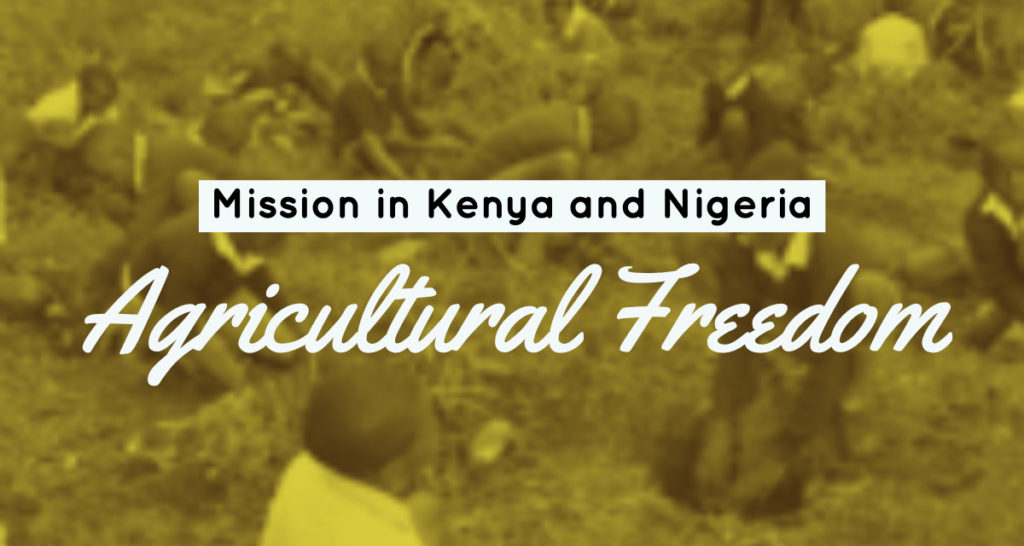Agricultural Freedom Through Seedballing
Planting trees has proven over time to have immense advantages ranging from its economic, environmental, and health benefits for individuals and the community at large. However, due to the realization of the concept of deforestation the earth has lost more than half of its natural trees.
Deforestation has scientifically been proven to have accelerated climate change by releasing carbon dioxide into the atmosphere and increasing soil erosion and desertification. This has caused an evident change in the environment and thus forcing human beings to adapt to highly unfavorable climatic changes. These changes continue to threaten and almost cripple the agricultural aspect of human existence.
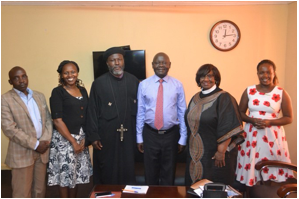
Deforestation is made manifest in different forms including wildfires, cutting down of trees, and development. Kenya loses 5.6 million trees daily. Reports indicate that the country’s forest coverage stands at 7.6 percent, below the target level of 10 percent. Less than 5% of Nigeria’s land is covered by trees with the few remaining forests under threat. According to the Food and Agriculture Organization of the United Nations (FAO), Nigeria has the highest rate of deforestation. One of the key solutions toward climate change is to plant as many trees as we can. Trees play a key role in supporting life by producing oxygen and absorbing climate-change-causing carbon dioxide.
Seedballs, also known as clay dumplings, have provided a means of planting trees without opening up the soil through a technique known as seedballing. The throw and grow technique was first known to have been used in Egypt to repair firms after the Nile flooded. This is in itself advantageous because it allows land to naturally gain back its fertility, that is most often stripped off by poor agricultural methods. Through seedballing, a farmer is now able to plant trees without wasting water, time, and energy. According to an analysis by Seedballs Kenya, the traditional method of tilling the land requires about $160 per hectares, water, labor, and time before complete growth is achieved. Alternatively, through spreading the seeds on the ground, the farmer is now able to spend as little as $8 per hectare. The trees arrive at maturity between 4-14 years after germination has taken place. The community is now able to benefit from the sustainable agricultural production, thus improving the well–being of the community’s agricultural sector.
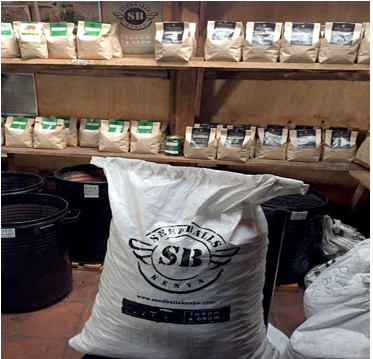
The throw and grow seeds have been designed to survive in different climatic regions. According to a statement by Teddy Kinyanjui, co-founder of Seedballs Kenya, “the farmers need to get the right seed for the right area. Even during the dry season, the farmer just needs to throw the seeds on the ground, and once the rains come, the seed will germinate. He further added that, “One can plant a huge sum of seedballs within a short period of time.” With the increase in climate change, water is fast becoming a scarce resource. The round-like seeds have been designed in a manner where they can survive even in harsh climatic conditions. The seeds are derived from a combination of clay and organic materials such as compost, worm casting, and well-decomposed manure. The seeds are covered with a portion of fibers such as paper mash or charcoal which protects the seeds from birds and insects.
Tree for Life Project
Kenya’s population of nearly 50 million is projected to reach 95 million in 2050 with over half of Kenyans relying on wood energy as their source of fuel resulting in the reduction of Kenya’s forest cover. Currently, Kenya’s forest coverage stands at 7.6 percent, below the target level of 10 percent. Even as the community is encouraged to plant trees, there is a need for the community to be empowered on ways we can save the wood energy so as to protect our forests. The community needs to be aware of the respiratory risk they are exposed to while using charcoal and encouraged to embrace clean energy for cooking. The World Health Organization (WHO) records a total of 4.3 million annual deaths attributed to diseases associated with cooking using incomplete combustion.
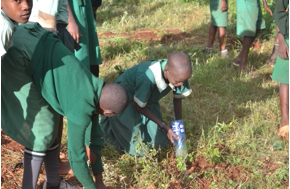 At a time where climate change is in a crisis, there is pressure on faith leaders to take action. At OAIC, we believe in justice in terms of distribution of knowledge, opportunities, and privileges within the African society. We are happy to announce that this year, one of the ways we will work to mitigate the effects of climate change on the environment will be by planting 100 million trees across Africa. Through the seedballing technique, OAIC aims to implement the reforestation strategy across Africa. The project will be rolled out in churches and learning institutions to encourage alternative energy use, conduct environmental education, and climate action advocacy.
At a time where climate change is in a crisis, there is pressure on faith leaders to take action. At OAIC, we believe in justice in terms of distribution of knowledge, opportunities, and privileges within the African society. We are happy to announce that this year, one of the ways we will work to mitigate the effects of climate change on the environment will be by planting 100 million trees across Africa. Through the seedballing technique, OAIC aims to implement the reforestation strategy across Africa. The project will be rolled out in churches and learning institutions to encourage alternative energy use, conduct environmental education, and climate action advocacy.
The long rains are approaching East Africa and will begin in March. As we approach this season, we will work with our sisters and brothers living in the Northern part of Uganda to establish tree nurseries. Many of the refugees from Sudan are living in this area. There is a need to work with the community in the restoration of the environment. With the influx of refugees, along with the host community, more trees are needed for cooking. This puts a strain on the natural resources in the area. The planting of trees as well as looking into alternative cooking methods are essential.
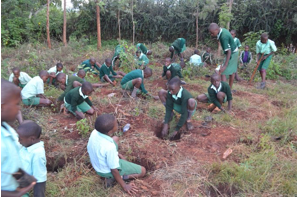
The tree for life project was started in 2015. This project is aimed at tackling the issue of deforestation. Since the launch of the pilot phase in Machakos, the OAIC Just Communities program has planted trees and trained members of the African Brotherhood Church (ABC) congregation on climate change and tree planting. The OAIC Just Communities program team met the county government to discuss partnership in the area of environmental conservation, establishing green schools, as well as constructing sustainable buildings/churches/school, etc. The OAIC project team has successfully initiated partnerships with other organizations to roll out a faith-based curriculum for sustainable development to equip leaders in African Independent and Instituted Churches to use the power of the pulpit to inspire sustainable environmental practices. The project is positively impacting the lives of members of the ABC church who are now conscious of their role in climate action and environmental conservation, and some have planted trees in their homes.
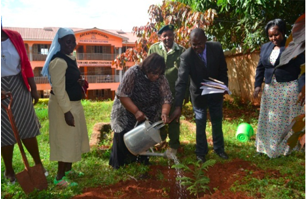
At OAIC we believe that Seedballing is the answer to having agricultural freedom. The seeds are indigenous, diverse, adaptable, and climate-friendly. All you need is to throw them, and they will grow anywhere there is land to germinate them. This effortless technology can have a rippling effect across the African environmental landscape, because trees improve the oxygen level, soil health, and the ability of the canopy of trees to trap dust and create a healthy ecosystem. We invite you to join us in prayer support as we plant seedballs throughout Africa. “He/she who plants a tree plants a hope.”
Phyllis Byrd serves with the Organization of Africa Instituted Churches (OAIC) in Kenya. Her appointment is made possible by your gifts to Disciples Mission Fund, Our Church’s Wider Mission, and your special gifts.

